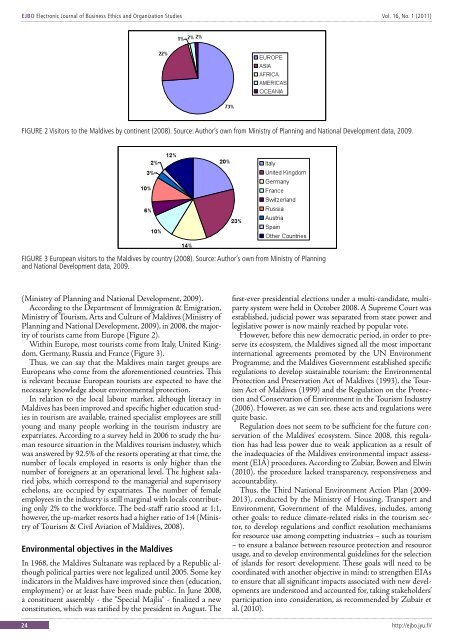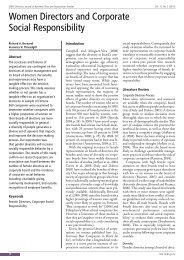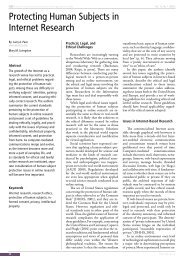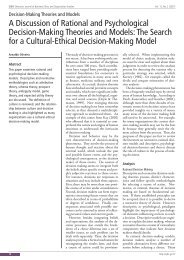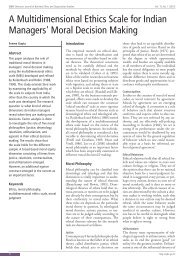View PDF - Electronic Journal of Business Ethics and Organization ...
View PDF - Electronic Journal of Business Ethics and Organization ...
View PDF - Electronic Journal of Business Ethics and Organization ...
- TAGS
- electronic
- ethics
- ejbo.jyu.fi
Create successful ePaper yourself
Turn your PDF publications into a flip-book with our unique Google optimized e-Paper software.
EJBO <strong>Electronic</strong> <strong>Journal</strong> <strong>of</strong> <strong>Business</strong> <strong>Ethics</strong> <strong>and</strong> <strong>Organization</strong> Studies Vol. 16, No. 1 (2011)<br />
FIGURE 2 Visitors to the Maldives by continent (2008). Source: Author’s own from Ministry <strong>of</strong> Planning <strong>and</strong> National Development data, 2009.<br />
FIGURE 3 European visitors to the Maldives by country (2008). Source: Author’s own from Ministry <strong>of</strong> Planning<br />
<strong>and</strong> National Development data, 2009.<br />
(Ministry <strong>of</strong> Planning <strong>and</strong> National Development, 2009).<br />
According to the Department <strong>of</strong> Immigration & Emigration,<br />
Ministry <strong>of</strong> Tourism, Arts <strong>and</strong> Culture <strong>of</strong> Maldives (Ministry <strong>of</strong><br />
Planning <strong>and</strong> National Development, 2009), in 2008, the majority<br />
<strong>of</strong> tourists came from Europe (Figure 2).<br />
Within Europe, most tourists come from Italy, United Kingdom,<br />
Germany, Russia <strong>and</strong> France (Figure 3).<br />
Thus, we can say that the Maldives main target groups are<br />
Europeans who come from the aforementioned countries. This<br />
is relevant because European tourists are expected to have the<br />
necessary knowledge about environmental protection.<br />
In relation to the local labour market, although literacy in<br />
Maldives has been improved <strong>and</strong> specific higher education studies<br />
in tourism are available, trained specialist employees are still<br />
young <strong>and</strong> many people working in the tourism industry are<br />
expatriates. According to a survey held in 2006 to study the human<br />
resource situation in the Maldives tourism industry, which<br />
was answered by 92.5% <strong>of</strong> the resorts operating at that time, the<br />
number <strong>of</strong> locals employed in resorts is only higher than the<br />
number <strong>of</strong> foreigners at an operational level. The highest salaried<br />
jobs, which correspond to the managerial <strong>and</strong> supervisory<br />
echelons, are occupied by expatriates. The number <strong>of</strong> female<br />
employees in the industry is still marginal with locals contributing<br />
only 2% to the workforce. The bed-staff ratio stood at 1:1,<br />
however, the up-market resorts had a higher ratio <strong>of</strong> 1:4 (Ministry<br />
<strong>of</strong> Tourism & Civil Aviation <strong>of</strong> Maldives, 2008).<br />
Environmental objectives in the Maldives<br />
In 1968, the Maldives Sultanate was replaced by a Republic although<br />
political parties were not legalized until 2005. Some key<br />
indicators in the Maldives have improved since then (education,<br />
employment) or at least have been made public. In June 2008,<br />
a constituent assembly - the "Special Majlis" - finalized a new<br />
constitution, which was ratified by the president in August. The<br />
first-ever presidential elections under a multi-c<strong>and</strong>idate, multiparty<br />
system were held in October 2008. A Supreme Court was<br />
established, judicial power was separated from state power <strong>and</strong><br />
legislative power is now mainly reached by popular vote.<br />
However, before this new democratic period, in order to preserve<br />
its ecosystem, the Maldives signed all the most important<br />
international agreements promoted by the UN Environment<br />
Programme, <strong>and</strong> the Maldives Government established specific<br />
regulations to develop sustainable tourism: the Environmental<br />
Protection <strong>and</strong> Preservation Act <strong>of</strong> Maldives (1993), the Tourism<br />
Act <strong>of</strong> Maldives (1999) <strong>and</strong> the Regulation on the Protection<br />
<strong>and</strong> Conservation <strong>of</strong> Environment in the Tourism Industry<br />
(2006). However, as we can see, these acts <strong>and</strong> regulations were<br />
quite basic.<br />
Regulation does not seem to be sufficient for the future conservation<br />
<strong>of</strong> the Maldives’ ecosystem. Since 2008, this regulation<br />
has had less power due to weak application as a result <strong>of</strong><br />
the inadequacies <strong>of</strong> the Maldives environmental impact assessment<br />
(EIA) procedures. According to Zubiar, Bowen <strong>and</strong> Elwin<br />
(2010), the procedure lacked transparency, responsiveness <strong>and</strong><br />
accountability.<br />
Thus, the Third National Environment Action Plan (2009-<br />
2013), conducted by the Ministry <strong>of</strong> Housing, Transport <strong>and</strong><br />
Environment, Government <strong>of</strong> the Maldives, includes, among<br />
other goals: to reduce climate-related risks in the tourism sector,<br />
to develop regulations <strong>and</strong> conflict resolution mechanisms<br />
for resource use among competing industries – such as tourism<br />
– to ensure a balance between resource protection <strong>and</strong> resource<br />
usage, <strong>and</strong> to develop environmental guidelines for the selection<br />
<strong>of</strong> isl<strong>and</strong>s for resort development. These goals will need to be<br />
coordinated with another objective in mind: to strengthen EIAs<br />
to ensure that all significant impacts associated with new developments<br />
are understood <strong>and</strong> accounted for, taking stakeholders’<br />
participation into consideration, as recommended by Zubair et<br />
al. (2010).<br />
24 http://ejbo.jyu.fi/


